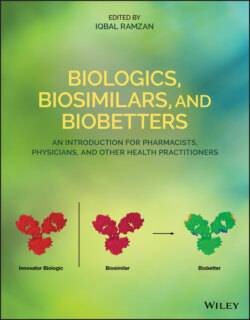Читать книгу Biologics, Biosimilars, and Biobetters - Группа авторов - Страница 17
1.3 Innovator Biologics, Biosimilars, and Biobetters 1.3.1 What Is a Biologic Medicine?
ОглавлениеBiologic medicines are active substances made by or derived from a biological source, rather than a chemical source, or synthesized chemically. Biologic medicines are also known as biopharmaceuticals or biotherapies and they are comprised of proteins such as vaccines, hormones, enzymes, blood products, allergenic extracts, monoclonal antibodies (mAbs), human cells and tissues, and gene therapies (Table 1.1). Typically, biologics are proteins or protein‐containing fragments. The first biologic (recombinant human insulin) was approved in 1982.4
When a biological medicine is administered to a patient, the expectation is that it will function as the natural endogenous protein, resolving clinical symptoms and either preventing or slowing the progression of the disease process. The mechanism(s) by which biologic medicines produce their clinical effects varies from product to product and across different clinical indications and diseases. Biologics may be tailor‐made to target the desired receptor or cells in the body.
Table 1.1 Broad categories of biologic medicines.
| Biologic | Description |
|---|---|
| Hormone | A substance (peptide or steroid) produced by a tissue or organ to elicit a physiologic action |
| Vaccine | An agent containing an antigen (live, killed, or attenuated pathogenic agent) to stimulate the immune system |
| Interferons | Proteins produced by cells in response to bacterial or viral infections |
| Growth factors | A substance that promotes growth, especially cellular growth |
| Polypeptides | Peptides containing from 10 to 50 amino acids |
| Proteins | Naturally occurring or synthetic polypeptides generally of 10 kDa in size |
| Monoclonal antibodies (MAbs) | A single synthetic immunoglobulin produced by recombinant techniques directed against a single antigen or endogenous molecule |
| Interleukins | Group of cytokine proteins |
| Cellular and tissue biotherapies | Like CAR‐T |
| Emerging biotherapies | Like antibody–drug conjugates or bispecific antibodies |
Terms like “de novo biologic drugs” or “bio‐originators” have also been used in the biologics literature. The first (initial) biologic medicine belonging to a specific class or category to be approved and registered (and/or marketed) is known as an innovator biologic or the biologic reference product. The term originator biologic is also used.
Biotechnology techniques are increasingly associated with the production of most biologic medicines. Biotechnology is the application of bioengineering techniques to manipulate living organisms such as bacteria or yeasts or living cells, of bacterial, animal, or human origin to produce biologic compounds for medicinal or other purposes. Genetic engineering is used to produce the required molecules or proteins of interest. The cells have their genes altered or modified, using recombinant DNA techniques so that they produce a specific substance or perform a specific function, that is, the genes for a particular protein are introduced into the genes of a host cell, which then produces the specific protein of interest.
Each innovator biologic manufacturer has its unique cell line and manufacturing process. The production processes are precisely controlled to guarantee the quality and consistency of the final product. The production of biologic medicines is complex and requires a very high level of technical expertise and numerous (hundreds or thousands) of in‐process tests during product development and manufacture.
